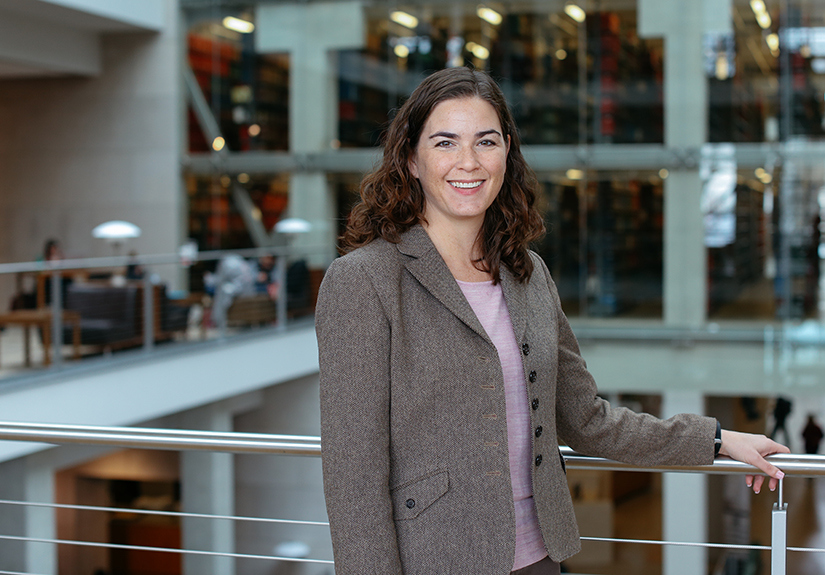Building bridges between Ohio State and the state health department
By Joshua Friesen

Every night when Elisabeth Root comes home, her daughter asks what she did that day.
“I’ll say, ‘Well, I told the governor this,’ or, ‘I got to help the public health department think about this,’” Root said. “And she’s like, ‘Mom, you’re actually getting to make a difference, and I think there’s lots of people who’d want to do that.’ And that’s how I feel. I think all of us as a community at Ohio State want to do something. We have this drive to help, and I’ve been handed an opportunity to be actionable.”
Root is an associate professor in both the Department of Geography and the College of Public Health’s Division of Epidemiology. In response to the COVID-19 pandemic, she is a member of a newly formed recovery team — along with CPH faculty Eric Seiber and Julianna Nemeth — serving as one of Ohio State’s liaisons to the Ohio Department of Health.
The recovery team’s objectives fall into three primary buckets: develop a surveillance system to monitor how the coronavirus progresses through the community; leverage data science techniques such as modeling to inform policy decisions; and advise public health officials to ensure the community’s safety and keep hospitals from becoming overwhelmed.
As the recovery team and ODH officials bring potential solutions to the table, Root connects with ODH Director Amy Acton and contacts appropriate Ohio State faculty whose expertise and research is applicable.
“I’m trying to figure out what faculty has the skills necessary to carry out very specific tasks our health agencies have identified as important for their response and recovery efforts,” she said.
One team Root organized was tasked with assessing the overall prevalence of COVID-19 in Ohio, and trying to identify how many asymptomatic carriers might be in the community. The team — which includes sociology Professor Sam Clark, CPH Professors Bill Miller and Stan Lemeshow, and CPH Associate Professors Maria Gallo, Abigail Turner and Alison Norris — designed a plan for the state detailing how to surveil COVID-19 to help predict where it may spread next.
“That’s a pretty big accomplishment and is so incredibly vital to our understanding,” Root said. “It’s the first step that needs to happen.”
Elisabeth Root is also helping lead a project exploring COVID-19 in the context of stress, social support concerns and factors associated with punitive parenting practices, including physical punishment.
The project was one of six recently awarded funding from the Office of Research to address critical health and community issues in the wake of the COVID-19 pandemic.
Root’s research sits at the intersection of spatial science and public health, and she’s often called upon to use her expertise to inform policymakers and government agencies. Thanks to her prior efforts working with groups such as the ODH, the Ohio Department of Medicaid and the Ohio Department of Higher Education, her role on the recovery team was a natural fit when COVID-19 emerged.
“I’ve developed a lot of social capital and really good relationships with our agencies trying to really serve that land grant mission of Ohio State,” she said. “This role is certainly in line with the relationships that I’ve created with our agencies prior to COVID-19.”
One of Ohio State’s goals is making a positive impact in the community. As the coronavirus collides with various aspects of society, there’s been no shortage of experts from an array of disciplines who’ve stepped up in the fight against the pandemic.
Root sees it as a chance to show the world what academic institutions can bring to the table, and she hopes the response to the crisis ushers in an era of more active and fruitful partnerships between academia and government.
“This is an opportunity for faculty who have deep knowledge and expertise,” Root said. “We’re a land grant institution. We support the state, and they support us. This is an unprecedented moment in history where we can make a difference.”
This story was originally published by the College of Arts and Sciences.
About The Ohio State University College of Public Health
The Ohio State University College of Public Health is a leader in educating students, creating new knowledge through research, and improving the livelihoods and well-being of people in Ohio and beyond. The College's divisions include biostatistics, environmental health sciences, epidemiology, health behavior and health promotion, and health services management and policy. It is ranked 22nd among all colleges and programs of public health in the nation, and first in Ohio, by U.S. News and World Report. Its specialty programs are also considered among the best in the country. The MHA program is ranked 5th and the health policy and management specialty is ranked 21st.